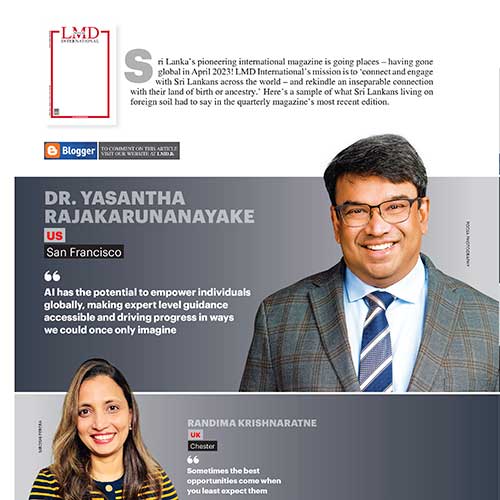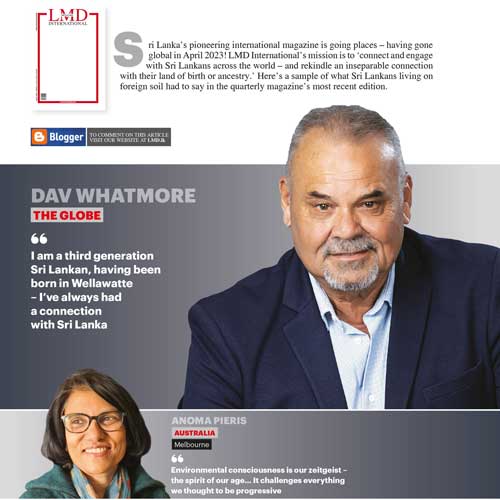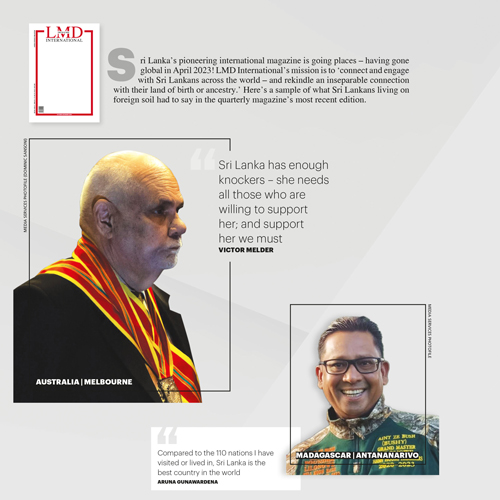SRI LANKANS OVERSEAS

NEED OF THE HOUR: ASTUTE LEADERS
Pasan Gooneratne
There’s a dire need for Sri Lanka to develop sustainable national policies

Q: As far as perceptions go, do you think Sri Lanka is capable of regaining its stability in the aftermath of the pandemic?
A: It will take a minimum of five years to come out of the dire financial situation we are in. Sri Lanka has discontinued many imports and artificially kept the dollar-rupee rate at much lower than it actually is – this will have severe financial repercussions on local industry.
 Q: How do you perceive Sri Lanka today?
Q: How do you perceive Sri Lanka today?
A: Sri Lanka made considerable progress between 1948 and 1977, and also in the post-2009 era.
The perception of Sri Lanka when it comes to corruption is high however, and we rank below the likes of Ethiopia and India in this regard. This has an adverse impact on potential investments in the country.
When investors wish to invest, they do so only for the short term. Venture capital investments for projects in other developed countries extend beyond two or three years since investors know their investments are secure and policy decisions won’t change overnight.
Q: And how do compatriots in your country of domicile view Sri Lanka?
A: They see it as a beautiful country with friendly people.
Q: Likewise, how do other Sri Lankans living in the UK perceive their motherland?
A: Everyone loves Sri Lanka – we all believe that with the right leadership, great things can be achieved.
Singapore is a prime example of how the right leadership can propel a country to success. It’s more or less a large supermarket structure and an international financial hub in spite of being a very small country.
We have to stem the outflow of foreign exchange by increasing domestic production and agriculture, and earn forex through exports.
 Q: What were your impressions of Sri Lanka on your last visit and how much has it changed from the past?
Q: What were your impressions of Sri Lanka on your last visit and how much has it changed from the past?
A: I was last in Sri Lanka in 2019. The construction of highways and expressways is obviously a major improvement but pollution has risen at an alarming rate. This is mainly because emission checks aren’t carried out properly on vehicles.
Bus and tuk-tuk drivers are never held responsible for driving badly. In most other counties, the fixed penalty points system, as well as insurance linked to individuals rather than their vehicles, automatically makes people more responsible drivers.
Insurance premiums should be higher if a driver has been at fault in a prior accident. People shouldn’t have to go to court over accidents – insurance companies must address these issues.
Q: From afar, how do you perceive news about Sri Lanka and what media do you rely on to stay connected especially during times of crisis?
A: BBC News, Sky News, Al Jazeera and RT are the news channels I watch.
Q: How do you view the brain drain and why is there still no reversal of it, in your opinion?
A: We all love to progress in life. The lack of opportunities to be good at what you do and able to monetise it is the reason for the brain drain.
Introducing a system to give something back to businesses that are in R&D will encourage them to invest more in innovation, which in turn will create job opportunities. This is one solution that other countries have employed.
Even an allocation of two percent on R&D in the national budget will greatly improve innovation and attract foreign exchange to the country.
 Q: What should Sri Lanka focus on most in the coming decade?
Q: What should Sri Lanka focus on most in the coming decade?
A: Sri Lanka needs long-term national policies and realistic budgets rather than arbitrary price increases throughout the year. Other areas include education that’s geared to automation and AI, and sustainable agriculture and economic growth – with a focus on innovation and technology driven industries.
Stop exporting raw materials; manufacture products that can then be exported. A good example is rubber – tyres will always be in high demand and currently, there’s a shortage. Graphene-based products are also marketable as they’re used in smartphones, wearables, batteries, virtual reality items, sports equipment, super capacitors, super cars and so on.
Q: And what are your hopes for Sri Lanka in the next decade or so?
A: Astute leadership that focusses on sustainable policy creation. Leaders must surround themselves with educated and experienced people in every field.






